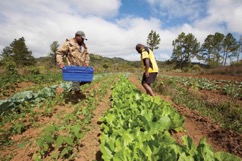 Small farming communities in developing nations struggle to survive in a global system built around cheap food. Farmers are competing against large “corporate” farms who have the ability to spend more, can sell production at a lower cost, and have access to technological resources. Systems, such as the government, influence the production, marketing, and success of small farms. For instance, small farms must meet the USDA processing, production, and packaging regulations which can end up costing these small farms more money in order to export their yield into the U.S. (Carolan, 2013, p.17). This governmental system also communicates the market “needs” for non-traditional production of food, such as fruit, which isn’t necessarily the circumstance (Carolan, 2013, p.17). Rather than using “market signals” to help small farmers understand the desired export(s) it instead communicates an inaccurate need. This can result in financial struggle which has the potential to put small farms out of business. Small farms are also put in direct competition with larger farm “corporations” who have the funds to produce a larger quantity of food, pay for labor, and export to the developing world.
Small farming communities in developing nations struggle to survive in a global system built around cheap food. Farmers are competing against large “corporate” farms who have the ability to spend more, can sell production at a lower cost, and have access to technological resources. Systems, such as the government, influence the production, marketing, and success of small farms. For instance, small farms must meet the USDA processing, production, and packaging regulations which can end up costing these small farms more money in order to export their yield into the U.S. (Carolan, 2013, p.17). This governmental system also communicates the market “needs” for non-traditional production of food, such as fruit, which isn’t necessarily the circumstance (Carolan, 2013, p.17). Rather than using “market signals” to help small farmers understand the desired export(s) it instead communicates an inaccurate need. This can result in financial struggle which has the potential to put small farms out of business. Small farms are also put in direct competition with larger farm “corporations” who have the funds to produce a larger quantity of food, pay for labor, and export to the developing world.
Previously, some developing countries were self-sufficient by providing their country with locally grown food. Instead, in a turn of events, these developing countries have turned to importing cheaper foods, particularly wheat, to “save” money. Rather than gaining the economic benefits as anticipated it has left these developing countries dependent upon importing cheap foods to provide food and sustainability for their citizens. But how long can these developing countries rely on cheap food before economic destruction?
Work Cited:
- Carolan, M. (2013). The Real Cost of Cheap Food. Florence: Taylor and Francis.
- Photo: Impact Farming. (n.d.). Retrieved January 22, 2018, from http://www.impactfarming.org

Yes, small farms and developing regions have a lot of difficulty competing with huge farms that can produce immense quantities at ridiculously low cost. International organizations like the World Trade Organization is also making it much more difficult for the smaller farms to survive. Although the WTO has a seemingly positive role in the global system (facilitating trade agreements, regulating tariffs, issuing subsidies), there is always going to be collateral damage. Subsidies issues to certain parts of the world mean that other parts of the world generate less business. Since these disadvantaged areas are not receiving them, nor are they generating business and profit, they eventually even lose money to support themselves or their local areas. It is an unfortunate cycle of financial hardship.